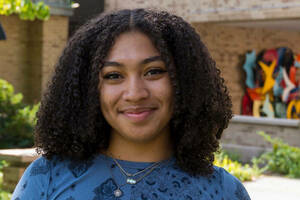
Analina Barnes is a sophomore studying anthropology with a minor in peace studies. Originally from New Orleans, Louisiana, she grew up speaking English, French, and Spanish at home. Analina chose Notre Dame because it was a well-regarded school and she felt that the academic programs here fit her interests.
In this interview, she talks about her future plans, combining her passions for peace studies and anthropology, and her definition of peace studies.
Why did you choose to pursue a minor in peace studies?
Last semester, I took a theology course. It was about Christian perspectives on war, peace, and revolution, and it was cross-listed as a peace studies class. I ended up enjoying it way more than I was expecting, and I enjoyed the peace studies part more than the theology part. I started thinking about adding a minor, and peace studies seemed like a really good fit as I'm also an anthropology major. So for me, it felt like a match for my major.
What has been your favorite peace studies class so far and why?
I am really enjoying “Introduction to Peace Studies.” It's awesome. We've had a lot of really cool guest speakers from the Kroc Institute. It's crazy to have people whose academic work you’ve read, and which is so highly regarded in the world of peace studies, come talk to you in your class.
I also like how multifaceted this class is because it engages us with so many different disciplines. We talk about various issues from many branches of anthropology, political science, and global affairs, and I think it is really eye opening.
If someone asked you how to describe peace studies to them, what would you say?
I have had this situation a couple of times already because my family has been asking me what I'm studying. I start by saying that it's the study of conflict and how to resolve it. However, in my classes, we have talked so much about how peace studies is more about conflict transformation than it is about conflict resolution. Still, when I describe it to people, I emphasize that it’s about how to engage with conflict and create a sustainable peace. That's the most solid explanation.
What do you want to do after you graduate?
I am considering grad school. I really want to go into ethnography, but I'm not sure exactly what disciplines within ethnography I would be doing. I guess marrying my interest in peace studies and anthropology is definitely something that I see on the horizon for me.
Where would you place yourself on the strategic peacebuilding wheel?
I see myself close to the restorative and transitional justice area. This is what I want to study, and have always been interested in activism.